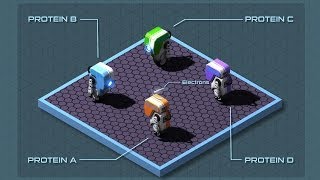(单词翻译:单击)
Every chicken was once an egg, every oak tree an acorn, every frog a tadpole.
小鸡的前身是蛋,橡树的前身是橡子,青蛙前身是蝌蚪。
The patch of mold on that old piece of bread in the back of your fridge, not so long ago that was one, solitary cell.
你家冰箱深处那片放了很久的面包上的霉菌,所有这些的前身,都曾是一个单细胞。
Even you were once but a gleam in your parents' eyes.
就连你自己,最初也不过是你父母投向彼此的一个深情注视。
All these organisms share the same basic goal: to perpetuate their own existence.
所有一切有机物都有一个共同的目标:让自己长存下去。
All lifeforms that we've discovered so far stay alive by using basically the same rules, materials, and machinery.
一切已知的生命体,其存在方式从本质上说,都采用同样的规则、原料和运行机制。
Imagine a factory full of robots. These robots have two missions:
请想象一个全是机器人的工厂。这些机器人有两种使命:
one, keep the factory running, and two, when the time is right, set up an entirely new factory.
第一个是保持工厂运作,第二个则是在时机成熟时,建立一个全新的工厂。
To do those things, they need assembly instructions, raw materials, plenty of energy,
为了达成这样的目标,他们需要把指令、原材料、大量的能量
a few rules about when to work normally, when to work quickly, or when to stop,
还有一些规则结合起来,这些规则是:何时正常工作,何时快速工作或者何时停止工作,
and some exchange currencies because even robots need to get paid.
以及如何获得一些奖励货币,因为即使是机器人,也应该有报酬。
Each factory has a high security office with blueprints for all the possible factory configurations
每间工厂里都有绝密办公室,里面藏着各种蓝图,描绘所有工厂结构,
and complete sets of instructions to make all the different types of robots a factory could ever need.
以及整套整套的指令,其目标是制造工厂所需的各类机器人。
Special robots photocopy these instructions and send them off to help make the building blocks of more robots.
特种机器人复制并发出这些指令,用于建立更多的机器人原件。
Their colleagues assemble those parts into still more robots,
他们的同事则组装起这些元件,制造出更多的机器人,
which are transported to the right location in the factory and given the tools they need to start working.
这些机器人被运送到工厂里相应的部门,然后他们拿起工具,开始工作。
Every robot draws energy from the central power plant,
每一个机器人都会从中央供电单元获取能量,
a giant furnace that can burn regular fuel but also scrap materials if not enough regular fuel is available.
那是一个巨型熔炉,不但消耗常规燃料,还可能在常规燃料不足的情况下,燃烧废旧原料。
Certain zones in the factory have harsher working conditions, so these areas are walled off.
工厂的某些部门工作条件更艰辛,因此这些区块都会筑墙防护。
But the robots inside can at least communicate with the rest of the factory
但这些墙内机器人至少可以和工厂的其他部门沟通,
through specialized portals embedded directly into the walls.
他们采用直接嵌入墙体的特别接口。
And as you've probably figured out, what we're describing here is a cell.
现在,你也许意识到了,我们向你描述的正是一个细胞。

The high security office is the nucleus.
绝密办公室是细胞核。
It stores the blueprints and instructions as deoxyribonucleic acid, or DNA.
细胞核存放设计规划蓝图和指令集,譬如脱氧核糖核酸也就是俗称的DNA。
The photocopied instructions are RNA.
被复制下来的指令是RNA。
The robots themselves are mostly proteins built from amino acids,
这些机器人本身来说,多数就是氨基酸组成的蛋白质,
but they'll often use special tools that are, or are derived from, vitamins and minerals.
但他们往往采用特殊工具,可以说,这些工具是或者源于维生素和矿物质。
The walls between factory zones and around the factory itself are mostly made up of lipids, a.k.a. fats.
工厂各部门之间的高墙,还有包围工厂的围墙,多数由脂类组成,也就是俗称的脂肪。
In most organisms, the primary fuel source are sugars,
在大多数有机物体内,主要燃料是糖类,
but in a pinch, fats and proteins can be broken down and burned in the furnace as well.
但在必要时,身体的熔炉也会分解掉脂肪和蛋白质,将其化为燃料。
The portals are membrane proteins which allow very specific materials and information to pass through the walls at the right times.
接口则是膜蛋白,它们使那些特殊原材料和信息得以适时通过高墙创造便利。
Many interactions between robot proteins require some kind of push, think robot minimum wage.
许多在机器人蛋白质之间发生的互动活动,都需要某种动机,就像要付给机器人最低工资一样。
A few small but crucial forms of money are transferred between proteins to provide this push.
一笔数量虽小但极为关键的货币在蛋白质之间转手,用以推动机器人工作。
Electrons, protons, oxygen, and phosphate groups are the main chemical currencies,
电子,质子,氧气以及各种磷酸盐就是主要化学货币,
and they're kept in small molecular wallets or larger tote bags to keep them safe.
它们要么被存放在小小的分子钱包里,要么是大手袋,总之很安全。
This is biochemistry,
这就是生物化学,
the study of how every part of the factory interacts to keep your life running smoothly in the face of extreme challenges.
这门学问研究工厂里每个元件如何互动,从而让你的生命运行无碍,无论面临何种极端的挑战。
Maybe there's too much fuel; your body will store the excess as glycogen or fat.
有时候会有过多的燃料;你的身体就会把多余的燃料作为糖元或脂肪储存起来。
Maybe there's not enough; your body will use up those energy reserves.
有时候燃料不足;你的身体就会动用能量储备。
Maybe a virus or bacteria tries to invade; your body will mobilize the immune system.
有时候某种病毒或者细菌正在门外蠢蠢欲动;你的身体则调动起免疫系统。
Maybe you touched something hot or sharp; your nerves will let you know so you can stop.
有时候你不小心碰到了滚烫或者尖锐的东西;你的神经系统会通知你立即停下。
Maybe it's time to create a new cell or a new person.
有时候则是分化出新细胞或者新的人类的时候了。
Amazingly, oak trees, chickens, frogs, and, yes, even you share so many of the same basic robot and factory designs
多么神奇:橡树,鸡,青蛙,对了还有你,都有很多相似的机器人和工厂设计,
that biochemists can learn a lot about all of them all at the same time.
这些都是生物化学家可以从中研究学习的地方。


